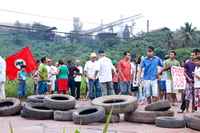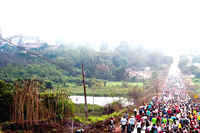Piquiá de Baixo, Brazil: 1,100 people’ life at risk
About 380 families (1,100 people) live for about 40 years in Piquiá de Baixo, Açailândia, Maranhão State, Amazon Region, Brazil. Since the arrival of the iron and steel industry in 1987, they have been affected by five pig-iron plants [1] , a railroad and other Vale’s industrial facilities [2] operating continuously and very close to their homes.
The incessant pollution, the continuous deterioration of water resources, along with the extremely precarious system of urban sanitation have impacted the living conditions of the residents as well as their lands, affected their livelihoods and increased the insecurity and poverty of the affected communities, in violation of their right to health, and to an adequate standard of living.
An investigation conducted by FIDH and its Brazilian partners Justiça Global and Justiça nos Trilhos, in 2010/2011, underscored serious health problems generated by the emission of pollutants by the pig-iron plants, coal furnaces, and other industrial facilities. The pollution of the air, the water and the soil has caused/increased respiratory diseases, eye and skin maladies, and other afflictions. The investigation also revealed that the residents suffer from lack of access to health services.
Since the establishment of those industries in the region, deaths have occurred repeatedly due to serious respiratory illnesses in the respiratory system, such as lung or other organ cancer. There have also been deaths of children in contact with incandescent slag. An investigation conducted by a Brazilian reputable biologist, Ulisses Brigatto Albino, attested in 2007 that the coexistence between industries and healthy human beings in that area was unfeasible.
In 2008 the inhabitants' association held a consultation with all residents. About 95% chose to fight for their collective resettlement in another area, free from contamination.
The struggle of the residents for their resettlement lasts 04 years and continues until today. Despite some advances, as the conquest of a new land in March 2012 and an independent technical consultancy for projecting the new neighborhood, in October 2012, many other measures are still lacking. At the same time, no action has been taken by the State in order to control the pollution, provide precautionary alternatives to the residents or make companies accountable for the damages caused to them in the last 25 years.
Brazilian Judicial system has not responded satisfactorily to 21 families’ lawsuits, which started in 2005 and have not had any conclusion by now. The absence of reparation measures and adequate guarantees of non-repetition demonstrates a violation of the right to due process and effective remedy.
Nowadays, inhabitants continue to live in Piquiá de Baixo, under the same conditions. At the same time, new industrial projects are being vigorously implemented in the region, with Brazilian State permits, tax benefits and generous financial credits by BNDES.
[1] Companhia Siderúrgica Vale do Pindaré, Ferro Gusa do Maranhão Ltda. (FERGUMAR), Gusa Nordeste S/A, Siderúrgica do Maranhao S/A (SIMASA) and Viena Siderúrgica S/A. The whole production of pig iron is exported, mainly to the U.S.
[2] Vale, the second largest mining company in the world, operates in 38 countries. The giant transnational company extracts iron ore from its big mines in Carajás, in the heart of the Amazon Forest, and provides it to be processed and transformed into pig iron in Pequiá, Açailândia. Vale also takes the whole production of pig iron by its trains towards its ports in São Luís do Maranhão. Vale’s activities represent close to 82% of total iron ore exports in Brazil. Vale’s operations comprise 15% of total global iron ore extraction.



